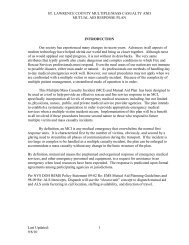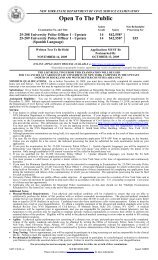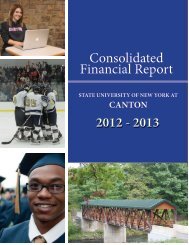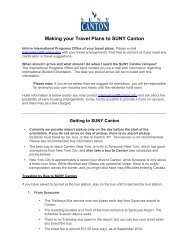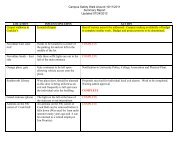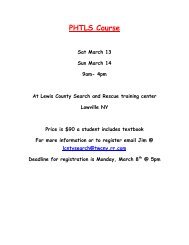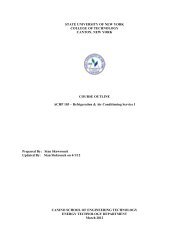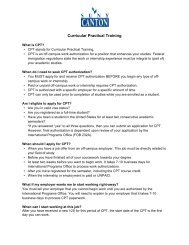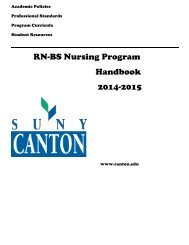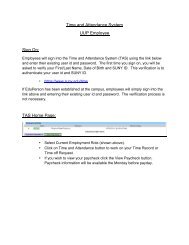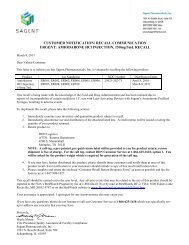Student Handbook - SUNY Canton
Student Handbook - SUNY Canton
Student Handbook - SUNY Canton
You also want an ePaper? Increase the reach of your titles
YUMPU automatically turns print PDFs into web optimized ePapers that Google loves.
occasion and students are always strongly<br />
encouraged to report a medical emergency.<br />
The positive impact of reporting a medical<br />
emergency will always hold the highest<br />
priority when determining the appropriate<br />
response for University policy violations.<br />
Repeated use of the amnesty provided by<br />
the Policy is cause for a higher level of concern<br />
for the well-being of the student and amnesty<br />
in these cases will be individually reviewed.<br />
Parental Notification:<br />
Because parents are vital partners in the<br />
educational process and because the student<br />
can be best supported from home, <strong>SUNY</strong><br />
<strong>Canton</strong> typically contacts parents of students<br />
under 21 years of age in instances where<br />
there is evidence of risk to health, welfare<br />
or safety. In addition, <strong>SUNY</strong> <strong>Canton</strong> may<br />
record names of those students involved to<br />
enable <strong>SUNY</strong> <strong>Canton</strong> to follow up with<br />
the students as deemed necessary to ensure<br />
a student’s well-being.<br />
Mandatory Intervention Program:<br />
A student who receives medical assistance<br />
for alcohol use under the Good Samaritan<br />
911 Policy will be referred by the Dean of<br />
<strong>Student</strong>s/Chief <strong>Student</strong> Affairs Officer or<br />
their representative to a mandatory intervention<br />
program, such as the Decision Making<br />
Course at the <strong>SUNY</strong> <strong>Canton</strong> Counseling<br />
Center. Additionally, a student who qualifies<br />
for the Good Samaritan 911 Policy by<br />
calling for medical assistance for another<br />
student may be referred to this program at<br />
the discretion of the Dean of <strong>Student</strong>s/Chief<br />
<strong>Student</strong> Affairs Officer.<br />
Frequently Asked Questions<br />
Q. What if I am underage and drunk when<br />
I call for help for a friend<br />
A. In this situation, emergency personnel<br />
will be mainly concerned with the<br />
person who needs the most help. Make sure<br />
to stay with your friend until help arrives.<br />
Emergency personnel might want to ask<br />
you a few questions about how much the<br />
sick person had to drink or if they mixed<br />
the alcohol with any other drugs, for example.<br />
This information will be critical to<br />
helping your friend. In such a case, <strong>SUNY</strong><br />
<strong>Canton</strong> will not refer you or the person<br />
you called for an alcohol violation.<br />
Q. Will my name be recorded if I call for<br />
help for my friend<br />
A. In most situations, if you are levelheaded<br />
enough to call for help and you<br />
are not showing signs of alcohol or other<br />
drug overdose, emergency personnel will<br />
RESIDENCE LIFE<br />
thank you for your assistance and simply<br />
help your friend.<br />
Q. How will anyone know I was the Good<br />
Samaritan who called for help<br />
A. In most cases, a professional staff<br />
member from Residence Life Life or the<br />
Dean of <strong>Student</strong>s Office will know that<br />
you called for help. If they do not know,<br />
you can simply inform them of your role<br />
in helping your friend or yourself.<br />
Q. Does the Good Samaritan Policy apply<br />
if I call for help for myself<br />
A. Yes<br />
Q. Does <strong>SUNY</strong> <strong>Canton</strong> contact my parents<br />
if I am transported to the hospital<br />
A. <strong>SUNY</strong> <strong>Canton</strong> does not automatically<br />
contact your parents when you are<br />
transported to the hospital. However, your<br />
parents would eventually be notified by<br />
mail if you are under 21 and had a hospital<br />
transport for alcohol or drug use.<br />
Q. What happens if I am transported to the<br />
hospital for the second time – does the Good<br />
Samaritan Policy apply<br />
A. While the main concern is the health<br />
and safety of every student, a pattern of<br />
behavior for hospital transports will require<br />
a staff member to review the situation and<br />
follow up using professional judgment for<br />
each individual situation.<br />
Q. What should I do if a friend is showing<br />
signs of alcohol poisoning or overdose<br />
A. Remember to Check, Call and Care.<br />
Alcohol overdose can be scary, but getting<br />
help is not.<br />
CHECK: Watch out for your friends<br />
throughout the night. Encourage healthy<br />
choices. If someone you know has consumed<br />
too much alcohol, check for signs of overdose.<br />
go to www.mayoclinic.org/diseasesconditions/alcohol-poisoning/basics/<br />
symptoms/con-20029020 for a list of signs<br />
of possible alcohol poisoning or overdose.<br />
CALL: If you discover any one of the above<br />
problems, call for medical help immediately.<br />
Call 911. The above indicators of alcohol<br />
overdose are very serious and time is of the<br />
essence.<br />
CARE: Continually talk to the person and<br />
monitor their skin color, temperature and<br />
breathing. Turn and keep the person on his/<br />
her left side as this will help to keep the person<br />
from choking should they vomit. Wait with<br />
your friend until help arrives; never leave a<br />
sick friend alone.<br />
For more information on <strong>SUNY</strong> <strong>Canton</strong>’s<br />
Good Samaritan 911 Policy, please contact:<br />
40<br />
Courtney Battista Bish, Dean of <strong>Student</strong>s/Chief<br />
<strong>Student</strong> Affairs Officer<br />
34 Cornell Drive,<br />
225 Miller Campus Center<br />
<strong>Canton</strong>, NY 13617<br />
Telephone: 315-386-7120<br />
Email : bish@canton.edu<br />
Prevention Education & Awareness Programs/Trainings<br />
The College has education programs to<br />
promote the awareness of rape, acquaintance<br />
rape, dating violence, domestic violence,<br />
sexual assault, and stalking. These education<br />
programs include primary prevention<br />
and awareness programs for all incoming<br />
students and new employees. These education<br />
programs will include: a statement that<br />
these crimes are prohibited at the College;<br />
definitions of consent, domestic violence,<br />
dating violence, sexual assault, and stalking<br />
in the College’s jurisdiction; safe and positive<br />
bystander intervention when there’s a risk<br />
of one of those incidents; information on<br />
risk reduction to recognize warning signs<br />
of abusive behavior and avoiding potential<br />
attacks; and information about the institutional<br />
disciplinary procedures. The various<br />
programs and trainings offered by the college/<br />
university are described below:<br />
1. Prevention Programs: These are programs<br />
to prevent dating violence, domestic<br />
violence, sexual assault, and stalking. The<br />
programs are culturally relevant, inclusive of<br />
diverse communities and identities, sustainable,<br />
responsive to community needs, and<br />
informed by research or assessed for value,<br />
effectiveness, or outcome. They also consider<br />
environmental risk and protective factors as<br />
they occur on the individual, relationship,<br />
institutional, community, and societal levels.<br />
• Specifically, at <strong>SUNY</strong> <strong>Canton</strong> provides<br />
training to all student leaders, Resident<br />
Assistants, social Greek organizations,<br />
student-athletes, and employees of the<br />
College. Anyone wishing to have a<br />
prevention program training should<br />
contact the Title IX Coordinator for more<br />
information.<br />
2. Awareness Programs: These are community-wide<br />
or audience-specific programming,<br />
initiatives, and strategies that increase<br />
audience knowledge and share information<br />
and resources to prevent violence, promote<br />
safety, and reduce perpetration.<br />
• Specifically, at <strong>SUNY</strong> <strong>Canton</strong> provides<br />
awareness programs to all student leaders,<br />
Resident Assistants, social Greek organizations,<br />
student-athletes, and employees<br />
of the College. Anyone wishing to have



